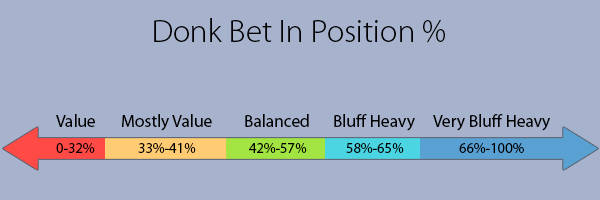Chapter 10: Float Bet
What is a “donk bet in position,” or “float”?
“Donk bet in position” and “float” are two terms for the same statistic.
“Float” itself has two completely different definitions in poker, which can initially cause confusion. One definition is used when, after a player raises preflop and continuation bets the flop, the preflop caller calls the flop continuation bet with a weak hand with the intention of bluffing the turn or river to win the pot. This is called “floating the flop.”
The second definition, and the one on which this article is focused, is used when, after a player raises preflop and decides not to continuation bet, the preflop caller bets when checked to. This is called a “float bet.”
In Poker Copilot the statistic for float bets is filed under “donk bet in position.” For readability, we will use the terms “float” and “donk bet in position” interchangeably in this article. (Please do not confuse “donk bet in position” with the donk bet statistic. To learn more about donk betting, a common play made by weak players, please read our article on donk bets.)
What to do when facing a float bet
You’ve been in this situation many times. You raise preflop, and then check the flop. Then your opponent bets against your weakness. It can be so frustrating to feel like your opponent is stealing pots from you every time you check!
The first step is to look at your opponent’s “donk bet in position” statistic.
Usually, you need roughly 800 or more hands on your opponent before this statistic starts to become reliable. Some players, however, will have a donk bet in position that is either much too high or much too low, and with these opponents you require a sample size of only 200 or more hands to get a good picture of their strategy.

Whenever you look at a statistic with percentages, you need to understand the percentage based on how loose or tight your opponent is. Opponents with a low VPIP/PFR with a 50% donk bet in position are going to have a much stronger range of hands than players with a high VPIP/PFR when they choose to float bet. If you’re confused about VPIP/PFR, don’t worry; we have an entire article that explains these statistics and how to use them to identify player types in poker.
Now that you understand the donk bet in position statistic, how can you use it to help your gameplay?
This statistic works in conjunction with how your opponents react to check-raising and how aggressive they are on further streets. When you are deciding whether to continuation bet, you need to ask yourself: will I make more money by betting or by checking?
Let’s look at some different types of opponents.
High donk bet in position and high fold to continuation bet on flop
Against this opponent, you should be inclined to check and call with your strong hands. This is because your opponent is more likely to bet as a bluff than call with a weak hand. This is called “slow playing.”
Logically, you should also be checking and calling with your medium-strength hands. This is because when opponents have a low fold to continuation bet on flop, they will usually be calling your bets with hands that are better than your medium-strength hands. However, if they have a high donk bet in position, it is likely that they are float betting weak hands that you can beat.
Low fold to continuation bet on flop and a low donk bet in position
Against these opponents, you should not slow play your strong hands. You make much more money by exploiting these players’ low fold to continuation bet on flop and can value bet a wider range of hands.
Deciding whether to check-raise, call, or fold
When your opponent “donk bets in position,” you have a choice to make. You can call, fold, or check-raise. With your weakest hands, you should fold. Your medium-strength hands are best used as a call.
With your strongest hands, you should either check-raise or simply call.
The more likely your opponents are to bluff on future streets, the more you want to continue calling and let them bluff away their money. The more passive they are on future streets, the more you want to get money in with your strong hands.
Please read our article on check-raising for an in-depth guide to the strategy.
When should you make a float bet?
While donk-betting is a strategy with a poor image, betting when the preflop raiser checks is a basic postflop skill to master. (Many of the concepts discussed in our continuation betting article are relevant to deciding when to make a float bet.)
Generally, the higher your opponents’ continuation betting percentage, the more they will fold to a float bet.
This is because when your opponents are continuation betting wider, they start to bet their weaker and medium-strength hands. When they check, they usually have a very weak range of hands that cannot continue against aggression.
If your opponents have a low continuation bet percentage, they are checking some stronger hands and are more likely to slow play. Against these opponents, you should be less inclined to make a float bet with anything but a strong range of hands.
Keep track of how your opponents react to your float bets and the kind of board textures that they continuation bet on.
Some opponents, for example, will always bet any pair on a board that has a flush draw possible. Against these opponents, you can make a float bet with a wider range on boards that have a flush draw when faced with a check. In these cases, your opponents are telling you that they do not have a strong hand; if they did, they would have bet out of fear of the flush draw.